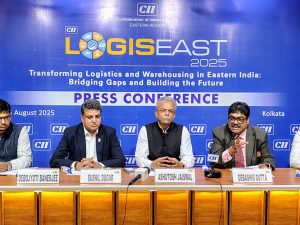Vipin Vohra, Chairman, Continental Carriers said, “The US decision to raise tariffs on Indian goods to 50 per cent poses a severe threat to India’s export competitiveness, especially in textiles, apparel, gems, jewellery and chemicals—sectors that contribute significantly to employment. Countries like Bangladesh, Vietnam and China will now enjoy a duty advantage, making Indian products less attractive in the US market. With nearly $8 billion in exports exposed, the impact could be deep, triggering job losses, especially among MSMEs and labor-intensive industries. Immediate government support, export diversification, and strategic dialogue with the US are critical to cushion the blow and protect India’s trade and employment base.”
Read More »‘MSMEs may end up losing market share, as costs will rise up’
A 25 per cent additional tariff on India, summing up to a total tariff of 50 per cent might be a huge setback and will impact chemicals, garments, jewellery, etc,” says Gautham R, Senior Manager – Global Air Freight, Head – Air Freight – India, WIZ. He adds, “Exporters see a challenging situation of losing the larger market share to the countries that have competitive tariffs, which can lead to the reduction in volumes from India to the US by 30-40% approx. if the situation prolongs. MSMEs who will not be able to absorb this sudden shift of cost increase would end up losing their traditional business, as the margins are already thin. We foresee that there may be a slight spike in air freight volumes for critical goods, as the additional 25% is applicable after 21 days, but the majority of the US buyers had kept the orders on hold for India. Airlines ex India would continue to experience the volatility in filling the belly space until we simultaneously find strong alternative markets by capitalizing on recent FTAs.”
Read More »‘The decision may risk disrupting long-standing trade partnerships’
The new tariff regime appears to be rooted in a protectionist push by the U.S. to reduce trade imbalances and reinforce domestic manufacturing,” said, Abhishek Goyal, ED and CEO, Aeroprime Group. He added, “India’s growing footprint in key export sectors has likely drawn increased scrutiny. While such measures may be politically motivated and serve as a tactic to exert pressure for expediting trade negotiations, they risk disrupting long-standing trade partnerships, economic relationships and global supply chains. At Aeroprime, we believe that trade diplomacy and bilateral engagement should take precedence over sudden tariff escalations.”
Read More »CSC launches TURANT app at Cochin International Airport
Cochin International Airport (CIAL) and Cargo Service Center (CSC) organised the Air Cargo Trade Meet 2025 to launch CSC’s TURANT app at the airport, marking a major step in advancing air cargo in Kerala. The app is designed to offer real-time tracking and full visibility of Export and Import shipments. CIAL and CSC brought together leading trade partners, dignitaries, and industry leaders for a gathering focused on growth, collaboration and innovation in the air cargo sector. The TURANT app, which had already been introduced at other major airports, is now expected to raise cargo handling standards in Kerala. It promises to improve transparency, efficiency and trust among both global and local stakeholders. CSC’s leadership noted that the partnership with CIAL reflects their ongoing focus on service excellence, innovation and security. With the launch of TURANT and continued investment in operations, CSC aims to support Kerala’s logistics sector and strengthen India’s air cargo infrastructure.
Read More »DP World unveils two new domestic rail services, links Bhimasar & Hazira
DP World has launched two new domestic rail services linking Bhimasar and Hazira in Gujarat to Kolkata in West Bengal. These new services are designed to accelerate cargo movement between India’s western manufacturing clusters and key eastern trade hubs, bolstering the Make in India initiative and supporting the country’s logistics transformation. The Bhimasar–Kolkata service will run twice a month with a transit time of 8 days and a capacity of 90 TEUs. The Hazira–Kolkata service will also operate twice a month, with a 7-day transit time and the same capacity, mainly carrying edible oils, chemicals, steel, industrial goods, food grains and salt on this key eastbound route. Gujarat is one of the powerhouses of Indian manufacturing, with 182 industrial estates, 21 special economic zones, over 800 large industries, and more than 450,000 with a strong presence across sectors such as chemicals, petrochemicals, dairy, pharmaceuticals, cement, ceramics, gems & jewellery, textiles, and engineering. Kolkata plays a vital role in international trade, with strong export activity across major global economies—particularly in the leather, textile, and tea industries.
Read More »CII LogisEast to boost East India’s logistics ecosystem
Building on the momentum created by the West Bengal Logistics Policy 2023, Confederation of Indian Industry (CII) Eastern Region is launching great initiative in the logistics and warehousing sector — CII LogisEast 2025. Scheduled for 12 and 13 August 2025 in meet Kolkata, this initiative aims to strengthen Eastern India’s logistics ecosystem, with West Bengal at the forefront. This comes at a time when India’s logistics industry, valued at over USD 320 billion, is undergoing rapid transformation through reforms like PM Gati Shakti, National Logistics Policy and continued investment in multimodal infrastructure. As the sector modernises, the inclusion of Eastern India in this growth story is essential. In this context, CII LogisEast 2025 aims to catalyse this shift, by enabling collaboration among industry leaders, policymakers, MSMEs and service providers, and by creating opportunities tailored to this region’s logistical strengths and needs. CII will also host a dedicated logistics and supply chain exhibition in Eastern India, as part of LogisEast 2025. The exhibition will showcase a curated range of logistics solutions, offering attendees a valuable opportunity to engage with emerging innovations and industry capabilities. The event is supported by key industry associations such as NACFS, FFFAI and CCHAA. At the press meet, Debashis Dutta, Chairman, CII West Bengal State Council & Director, BGS Group, said, CII LogisEast 2025 is more than just a summit—it is a defining platform that positions West Bengal as the cluster hub for logistics and warehousing, driving the region’s integration into India’s growth story. Ashutosh Jaiswal, Chairman, CII ER Logistics Sub-Committee & CEO and Director, Century Infra Ltd & Century Ports Ltd, stated the event’s central theme, ‘Transforming Logistics in Eastern India: Bridging Gaps and Building the …
Read More »Vidarbha to become logistics hub with new expressway
To boost road infrastructure and connectivity, Nitin Gadkari, Union Minister for road transport and highways announced new expressway from Nagpur to Vijayawada in Andhra Pradesh. “Vidarbha’s location is strategically advantageous,” he said adding, “The eastern ports in Andhra Pradesh are much closer to Nagpur than Mumbai, and they’re less congested too. A direct road link means reduced fuel consumption, shorter travel time, and lower logistics costs — key for making exports viable.” This upcoming expressway will be third major corridor originating from Nagpur, after the Nagpur-Mumbai Samruddhi Mahamarg and the planned Nagpur-Goa Shaktipeeth Expressway, for which land measurement has already begun.
Read More »Parandur airport likely to get delayed
Chennai’s second airport at Parandur may be delayed by a year. According to reports, land acquisition poses a major challenge and is one of the primary reasons for the delay of the project. Earlier Tamil Nadu govt planned to complete the land acquisition by October 2025 and start groundwork project by 2026.
Read More »Gadkari unveils 29 NH projects worth 5233 cr in AP
Union Minister for Road Transport and Highways Nitin Gadkari, along with Andhra Pradesh Chief Minister N. Chandrababu Naidu, inaugurated and laid the foundation stone for 29 National Highwayprojects in Mangalagiri on Saturday. The projects, worth over ₹5,233 crore, cover a total length of 272 km and aim to significantly boost connectivity and infrastructure across the state. Addressing the gathering, Gadkari said, “Aligned with the vision of Prime Minister Narendra Modi, these projects are designed to eliminate accident-prone black spots and railway crossings, reduce transportation costs, strengthen last-mile connectivity in rural and tribal areas, and decongest key urban centres such as Tirupati, Nellore, and Rayachoty—thereby positioning Andhra Pradesh at the forefront of India’s growth story.”
Read More »Pithampur MMLP construction work begins
The construction work for the proposed MMLP near Pithampur in Dhar district has started, with a dedicated commercial zone accounting for around 10 per cent of the total 112.6 hectare of the park, said reports. The project, estimated at Rs 1,110.6 crore, will be divided into multiple zones to cater to various services and operations. “The possession of the proposed land has been taken and with this the development work has started in the park. The park will become a boon to the state and give a massive fillip to industrial and logistics growth in the state,” said MPIDC officials in reports.
Read More » Cargo Breaking News
Cargo Breaking News









